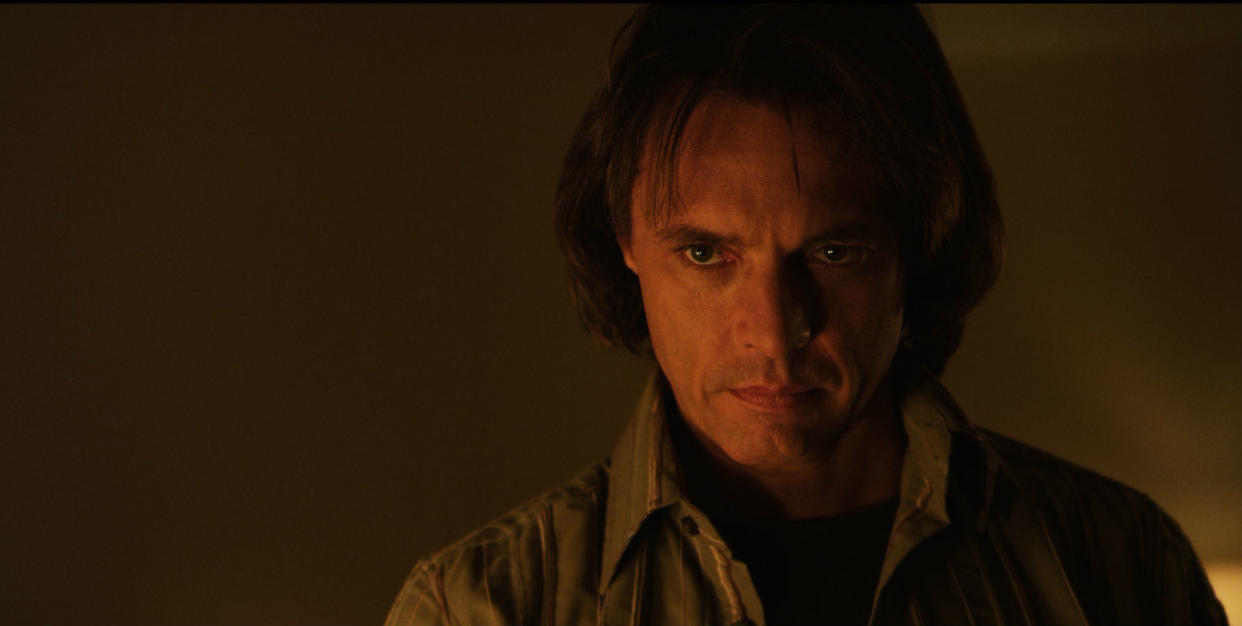Film Review: ‘3 Holes and a Smoking Gun’

The story of a hotly coveted unproduced screenplay that itself could use some drastic revisions, “3 Holes and a Smoking Gun” proves that there’s a chasm-wide difference between talking about what constitutes — and actually being — great writing. A dialogue-driven affair devoid of a single believable utterance or attendant reaction to circumstances or incidents, Hilarion Banks’ movie-centric crime drama concerns a former Hollywood screenwriting hotshot now teaching in New York and an ambitious pupil whose latest work draws his instructor’s eager attention — and quickly ensnares them both in a deadly competition for authorial rights. No amount of industry-jargon blather and flashback-fractured plotting, however, can mask the wholesale phoniness and overpowering lethargy of this dreary drama, whose commercial prospects are just about nonexistent.
Having flamed out as a cine-scribe in L.A., Bobby Blue Day (James Wilder) now peddles professional tutelage — peppered with anecdotes about his friendship with an illustrious director — to up-and-comers, including Jack (Zuher Khan). Bobby’s name is as laughable as is his cozily combative rapport with Jack, whose apartment he casually visits in order to strike up a bargain involving Jack’s supposedly crackerjack script, “Hijack.” Without a hint of the mentor-mentee dynamic one might expect, Bobby and Jack are, from their first moments together, verbally sparring over said draft like two antagonistic equals. Compounding their tete-a-tete’s bizarre awkwardness, they’re soon up on the building’s roof, where Bobby is dangling Jack off the ledge and bellowing cliches about “living on the edge.”
Back inside, Jack rejects Bobby’s efforts to gain a co-writing credit in exchange for getting the script produced, but then finds himself the target of suspicion when he turns out to be incapable of operating the Remington typewriter with which he supposedly wrote his work. After a pointless flashback to Bobby’s futile L.A. escapades that further negates any momentum, Banks’ film jumps backward in time to reveal the origins of “Hijack.” Unsurprisingly, those involve shady wrongdoing on the part of Jack, who found the script on the Internet, convinced the clueless England-transplanted author (Howard McNair) to meet him at a coffee shop, and then embarked upon a ruthless plan made more difficult by a subsequent run-in with a junkie mugger intent on acquiring what Jack so desperately wanted.
Consequently, “3 Holes and a Smoking Gun’s” entire narrative hinges on the implausible idea that a talented writer would naively offer up his prized creation online, and then be foolish enough to believe every outlandish fame-and-fortune promise offered by a mysterious stranger. Not helping matters is that Khan’s performance never strikes a single authentic beat — a problem shared by Wilder, who similarly overemphasizes every one of screenwriter Scott Fivelson’s lines. Marked by exaggerated mannerisms that often threaten to tip the proceedings into outright neo-noir parody, Wilder’s and Khan’s turns render the talky action ridiculous, and that’s before Jack’s wannabe-actress girlfriend Sailor (Rebecca Mae Palmer), who’s also Bobby’s ex, shows up during the third act in order to serve as a contrived complication to their witless battle.
Director Banks exhibits an unexceptional visual eye during the primary scenes set in Jack’s sparsely decorated flat, as well as in the intermittent, on-location trips outside to the streets of Manhattan and L.A. Nonetheless, set to Jason Lewis’ functional score, his compositions exhibit only a modest tendency toward show-offery, and thus come across as far more competent than the words spoken by his cast — if not, ultimately, capable of changing the film’s overarching direct-to-video quality.
Get more from Variety and Variety411: Follow us on Twitter, Facebook, Newsletter
